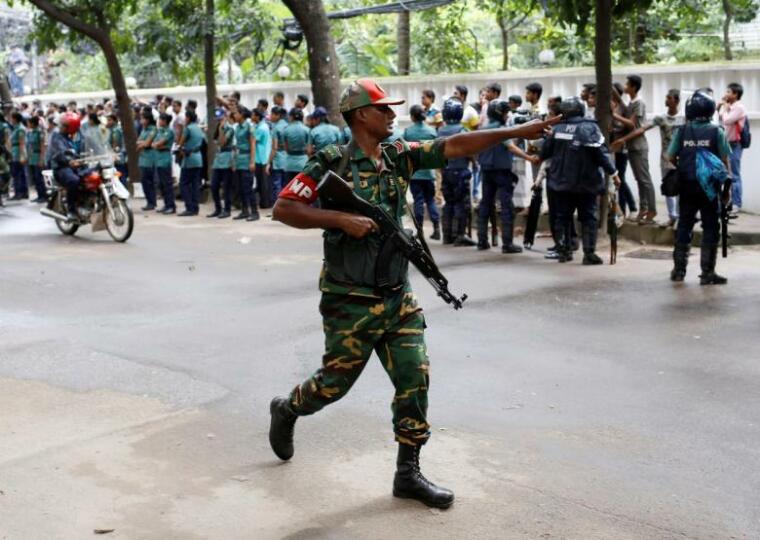200 Christian charities shut down in Bangladesh amid crackdown on foreign NGOs

Bangladesh has indirectly shut down 200 Christian charities as part of the government's crackdown on foreign NGOs that came as a response to a major terrorist attack in the country last year.
Bruce Allen of Forgotten Missionaries International (FMI) reported that 200 operating Christian charities have closed since the government passed the Foreign Donations (Voluntary Activities) Regulation Bill (FDRB) in October 2016.
The law was passed in an attempt to prevent terrorists from receiving funds under the disguise of foreign aid. The measure came after Islamic extremists attacked the Holey Artisan Bakery and Cafe in Dhaka, killing at least 20 people, including foreigners.
Under the legislation, an NGO must first register with NGO Affairs Bureau (NGOAB) in order to receive foreign funds and perform activities.
Allen noted that while some NGOs have been prevented from working in Bangladesh, some charities may still be able to continue if their work is focused on improving the lives of the Bangladeshis.
"If you're an organization, even if you're a Christian mission agency or NGO, providing non-religious services such as a hospital or relief work [and] things like that, and your services are available to anyone in Bangladesh, then you're able to continue to operate in Bangladesh," Allen said.
"So what they were really clamping down on was just overt religious activity, so things that were geared specifically for the Christian community," he added.
Last month, 17 foreign non-government development organizations were brought under intense surveillance after the charities were found to be involved in militants funding. Most of the terrorist funding was reportedly conducted through mobile banking and courier services. According to the Dhaka Tribune, the NGOs were based in Kuwait, Qatar, Saudi Arabia, Bahrain and other Middle Eastern countries.
After the attack on the cafe in 2016, tourism in Bangladesh has dropped significantly. Some were concerned that the decline in the tourism income, along with the closure of some NGOs, could create worse financial conditions for the Bangladeshis.
"It's a shame that these organizations that wanted to help the people of Bangladesh are now being prevented from doing that," said Allen.
While some Christian NGOs will not be able to operate in Bangladesh, FMI contended that it is still a viable choice for people looking to help and support Bangladeshi Christians because the ministry does not send people to work in the country. The ministry noted that it deals directly and exclusively with national church planters, and it tends to fly under the government's radar because it is not widely known.
 Christians don't have to affirm transgenderism, but they can’t express that view at work: tribunal
Christians don't have to affirm transgenderism, but they can’t express that view at work: tribunal Archaeology discovery: Medieval Christian prayer beads found on Holy Island
Archaeology discovery: Medieval Christian prayer beads found on Holy Island Presbyterian Church in America votes to leave National Association of Evangelicals
Presbyterian Church in America votes to leave National Association of Evangelicals Over 50 killed in 'vile and satanic' attack at Nigerian church on Pentecost Sunday
Over 50 killed in 'vile and satanic' attack at Nigerian church on Pentecost Sunday Ukrainian Orthodox Church severs ties with Moscow over Patriarch Kirill's support for Putin's war
Ukrainian Orthodox Church severs ties with Moscow over Patriarch Kirill's support for Putin's war Islamic State kills 20 Nigerian Christians as revenge for US airstrike
Islamic State kills 20 Nigerian Christians as revenge for US airstrike Man who served 33 years in prison for murder leads inmates to Christ
Man who served 33 years in prison for murder leads inmates to Christ


 Nigerian student beaten to death, body burned over ‘blasphemous’ WhatsApp message
Nigerian student beaten to death, body burned over ‘blasphemous’ WhatsApp message 'A new low': World reacts after Hong Kong arrests 90-year-old Cardinal Joseph Zen
'A new low': World reacts after Hong Kong arrests 90-year-old Cardinal Joseph Zen Iran sentences Christian man to 10 years in prison for hosting house church worship gathering
Iran sentences Christian man to 10 years in prison for hosting house church worship gathering French Guyana: Pastor shot dead, church set on fire after meeting delegation of Evangelicals
French Guyana: Pastor shot dead, church set on fire after meeting delegation of Evangelicals ‘Talking Jesus’ report finds only 6% of UK adults identify as practicing Christians
‘Talking Jesus’ report finds only 6% of UK adults identify as practicing Christians Mission Eurasia ministry center blown up in Ukraine, hundreds of Bibles destroyed: 'God will provide'
Mission Eurasia ministry center blown up in Ukraine, hundreds of Bibles destroyed: 'God will provide' Church holds service for first time after ISIS desecrated it 8 years ago
Church holds service for first time after ISIS desecrated it 8 years ago Burger King apologizes for 'offensive campaign' using Jesus' words at the Last Supper
Burger King apologizes for 'offensive campaign' using Jesus' words at the Last Supper Uganda: Muslims abduct teacher, burn him inside mosque for praying in Christ’s name
Uganda: Muslims abduct teacher, burn him inside mosque for praying in Christ’s name